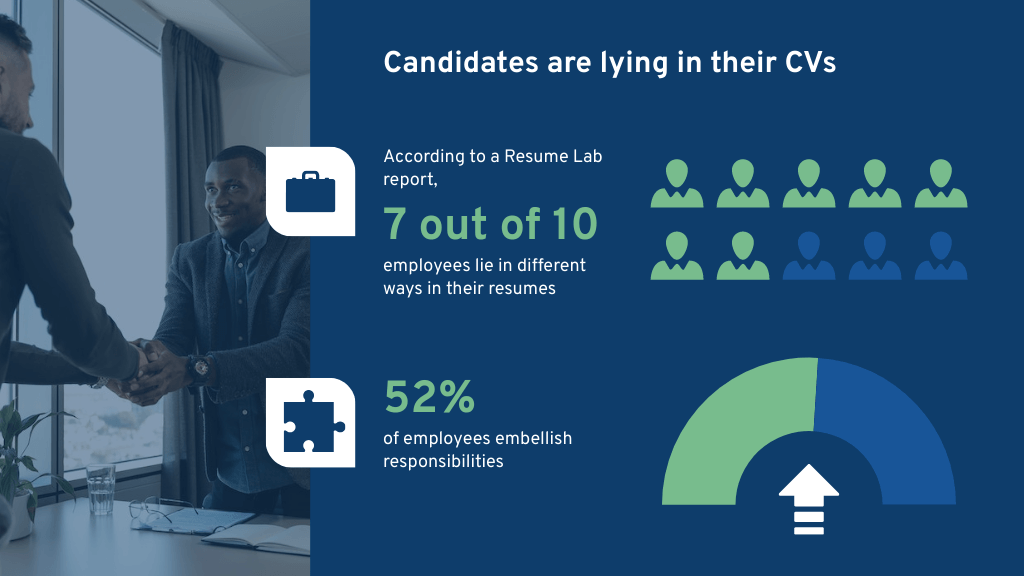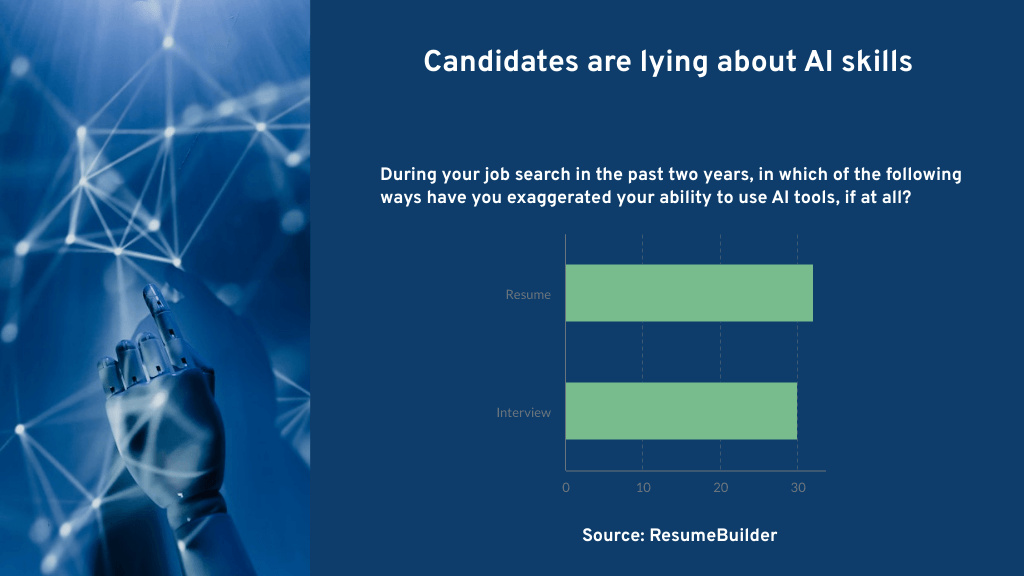7 in 10 workers lie in resumes – how do you catch them out?
Lying in resumes isn't the end of the world. Actually, 7 in 10 workers do it in different ways, and guess what, they include applicants in your company – and those you’ve already hired.

“Oh mum, I didn’t do it,” “I feel sick today, I don’t want to go to school,” “Yes, I finished my homework,” “It wasn’t my idea,” “I didn’t hear you call me.”
Do all these tiny, innocent lies sound familiar to you?
It would be a lie to not admit it.
We choose to lie from our childhood in our perpetual struggle to seek attention, to test our limits, or to avoid punishment. And it’s okay.
Lying is a sign that we have a steep imagination. It’s a step to our cognitive development and a way to be more independent at some point. It’s a way, if you want, to discover the value of honesty. It works fine when we are kids.
Contents
Lying in resumes is true
In adult life, things are different. As kids mature, they usually outgrow these fibs. They need to be honest in their personal and professional relationships. But some lies remain innocent.
Lying on your resumes isn’t the end of the world. Actually, 7 in 10 workers do it in different ways, and guess what, they include applicants in your company – and those you’ve already hired.

Today, as AI generative tools set in, it is easier than ever to present yourself in such a way that is a stretch of reality. However, when you repurpose a cover letter or leave AI to craft your whole CV without letting others know, is it still a lie of the same gravity?
Boundaries of lying may be subjective, but candidates choose to lie for one reason: to increase their appeal to the recruiter and to receive the coveted invitation for the job intervIew.
Perfect candidates are no longer the case
It is not surprising that for many years, the HR industry has been focused on finding the perfect candidate. However, discussions about diversity, on-the-job training, and hiring without borders were not being considered.
This practice drove many candidates to start lying about their hard and soft skills in order to present a better version of themselves and schedule an interview.
The interview remains until today the best process of identifying lies such as educational background, inflated work experience, time gaps, false skills, or a criminal record.
As a recruiter, you can encourage people to be honest, even by updating details in your job description about the company culture and your needs.
Don’t write a job brief that attracts only the best of the best. Instead, write a job description that embraces talent and different skill sets that could be helpful for your organization.
Give opportunities to rising talents and offer competitive on-the-job training to create the kind of employee that other companies would be jealous of.
But what happens even when you are so open and honest, and still come face to face with blatant lies? 75% of HR managers still catch a lie on a resume. How can you identify them? Let’s go deeper.
Can AI tools help candidates to lie better?
AI tools are prone to learning and they react based to what we prompt them.
This implies that if a candidate fails to include important details or, in a more concerning scenario, deliberately provides false information about their qualifications, the AI tools will incorrectly attribute those qualifications to the candidate.
Do you see the chaos that is coming? Don’t panic, because there are ways that can help you identify it.
How to find out if a candidate is lying?
You don’t have to buy a lie detector to identify if a candidate is lying. There are some indicators that could help you during the interview process to have a clear sentiment about it.
Some steps require being proactive as you navigate this labyrinth. Here are some actions you can take:
1. Employment verification
Verifying your employment history is a standard procedure. Employers reach out to former managers or HR departments to confirm details like dates of employment, job titles, and roles. Any discrepancies may be red flags. Don’t go crazy about it.
You can have a clear image just by visiting the candidate’s LinkedIn profile.
Did you know that lying is more common in high level positions? For example, employees in management and executive positions were found to be more prone to exaggerating their AI skills compared to other employees according to ResumeBuilder.

2. Background checks
Background checks delve into personal and criminal histories. If the information they provided conflicts with the findings of a background check, their credibility takes a hit.
3. Reference checks
References play a crucial role. Employers may contact the individuals that candidates listed to vouch for their character. Inconsistencies in the information may surface during these conversations, especially if they have resorted to using false references.
4. Interview inconsistencies
Lying during an interview is risky. Nervousness or the inability to answer industry-related questions can raise suspicions. Hiring managers noticing inconsistencies may prompt further investigation.
5. Educational background verification
Employers can verify candidate’s educational credentials by contacting the institution or using third-party services. Falsifying academic achievements can be uncovered through these checks.
6. Job assessment
Some companies incorporate skills tests in their hiring process. Discrepancies between claimed skills and test scores may expose dishonesty.
7. Inconsistent resume information
Hiring managers scrutinize every application component for coherence. Inconsistencies in job titles, duties, or an exaggerated career path may trigger deeper investigations.
And remember: 51% of candidates may have gotten a bit more excited when describing their job role in their resumes.
8. Lack of explanation
Vagueness in your resume or during the interview may signal a lack of actual skills or experience. Inability to provide specific details could lead hiring managers to question candidates’ qualifications. Embellishing responsibilities (52%) is the main reason for lying.
We live in a bad world, but we still have to believe in people. They are the most important asset of a company. Getting prepared means being ready to catch any lie, but there is no need to be an alternative to a truth detector. Look deeper and seek potential.
Think about all the reasons why kids used to lie.
Frequently asked questions
- What's the most common type of lie on resumes?
- The most frequent lies on resumes involve exaggerating job roles and responsibilities. Candidates often embellish their titles and duties to appear more qualified or experienced for the position they're applying for.
- How can employers verify a candidate's employment history?
- Employers can verify employment history by contacting previous employers or reviewing the candidate's LinkedIn profile. This helps confirm job titles, roles, and employment dates.
- What role do background checks play in verifying resume information?
- Background checks are crucial for verifying personal and criminal history. They help uncover any inconsistencies between a candidate's provided information and official records, highlighting potential dishonesty.
- Can job assessments reveal resume exaggerations?
- Yes, job assessments can expose discrepancies between a candidate's claimed skills and their actual abilities. If test scores don't align with stated qualifications, it may indicate resume fabrications.
- What should employers do if they find inconsistencies during an interview?
- If inconsistencies arise during an interview, employers should probe further for clarity. Asking for specific details or examples can help determine if the candidate genuinely possesses the claimed skills or experience.




